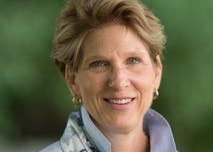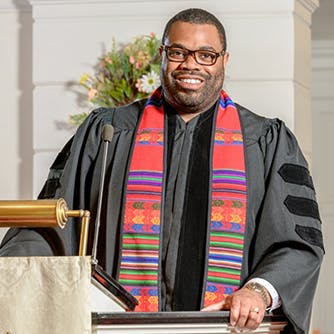Health & Well-Being
17 min read

Understanding the Impact Wellbeing Has on Communities and Congregations
People of call provide essential spiritual care and guidance, but this often impacts their personal and familial wellbeing, with financial stress being a significant factor. Unaddressed, this stress can lead to burnout, reducing their effectiveness to serve.
In this article, we invite Dr. Barbara E. Livingston, a pastoral psychotherapist and clergy consultant, the Rev. Dr. Michael L. Sloan, Senior Pastor, Spencerport, New York, and Kim Miller, Sr. Program Manager Partnerships and Financial Education for LSS Financial Counseling, to explore the link between financial security and overall wellbeing.
Q: In your respective areas of work, how do financial stress and uncertainty uniquely impact those in ministry roles—clergy, lay leaders, or caregivers?
For most people in ministry, conversations about money—especially their own—tend to be a major source of stress. It is not unreasonable to say that this is in large part due to lack of education and skill-building around money. Most people worry about whether they will have enough income to meet their needs. This uncertainty of whether your financial needs can be met by the institution you serve is very stressful.
To thrive in your call, it is crucial to pay attention to your financial needs as you consider how you generate and spend income. In my work with people of call, financial stress and lack of financial education have often been swept under the rug—seminary rarely offers instructions on financial management and how to handle its related stresses. For many, knowing how to be fiscally responsible can be overwhelming, making it easier to tell yourself stories about how you will deal with that when you have time. When “time” never comes, the problem compounds itself and pushes the stress needle ever higher. There is also often a lack of insight surrounding personal family history with money and financial management. I have heard from many clergy that they never learned any of this and feel a certain amount of shame discussing their finances.
—Dr. Barbara E. Livingston
The financial stress that ministers are under today has caused some clergy to think about leaving the ministry altogether. I encourage clergy and congregations to begin thinking outside the box. Clergy who are part-time or quarter-time can take on other roles such as real estate agents, substitute teachers, consultants, social media influencers, or chaplains. Congregations can also play a part in this by creating more streams of revenue outside of financial donations from parishioners. The uncertainty of the future state of the church has also caused seminary enrollment across the country to decline significantly. Consequently, seeing that there are fewer people entering seminary has caused a deficiency in well-trained clergy leading congregations.
—the Rev. Dr. Michael L. Sloan
Financial stress and uncertainty deeply impact people in ministry and caregiving roles because they’re doers who tend to put themselves last—often unconsciously—while focusing on others. As personal finances go unaddressed, a pressure cooker situation builds up and starts affecting every area of their lives. We find that financial stress impairs decision-making, leading to fatigue and last-minute choices that often worsen the situation. Debt becomes a short-term fix with long term ramifications on finances and cash flow. Nowadays, everything is posed as a monthly payment for this and a monthly payment for that, and ultimately, all those costs add up quickly. When meeting with clients, we help them see the full financial picture so they can explore options to help release the pressure of that stress. Uncertainty steals joy, particularly around debt or income, so we encourage people to focus on what they can control, write things down, and take small, clear steps forward.
—Kim Miller
Q: Dr. Livingston, what trends are you seeing in the mental health and wellbeing of ministry leaders today that may impact the communities or congregations they serve? Do you see a connection between mental health and financial health among ministers?
I believe there is a definite connection between mental health and financial health among leaders in ministry. If you are living in a constant state of worry or fear about your financial health, it can only impact the work you are trying to do. There is a growing concern among church leaders in addressing the issue of declining membership while simultaneously facing budget deficits. Survival of the institution is one of many stressors on clergy actively serving a congregation. In response to this and many other concerns, care of health and wellbeing becomes an afterthought and is often what takes the biggest hit because there is too much to do, not enough people power to do it, and not enough resources.
Many clergy feel stretched and undervalued, putting the needs of others ahead of their own.
Frequently, in balancing all the demands of this challenging work, personal financial management falls to the bottom of the list. It surfaces when there is an unexpected personal expense, or you suddenly realize that retirement is not far off and you are unprepared. This invites thoughts like, “I don’t even know where to begin. I feel so embarrassed.” To thrive and flourish, religious leaders must prioritize self-care and wellbeing practices that include good fiscal health.
—Dr. Barbara E. Livingston
Q: In your respective roles in serving ministers, what strategies have you found effective in enabling them to maintain their overall mental and financial wellness?
There are many helpful strategies clergy can utilize to help develop and maintain what I would call total wellness. Insight into your own emotional, financial, and family history is critically important for people to understand. Otherwise, you may find yourself in a situation of the “tail wagging the dog” instead of feeling in control. To address the importance of wellbeing and financial confidence, I am writing an eight-part article series, and offering several webinars that discuss how to develop and maintain mental health practices. You can find these articles on www.evercall.org under Health & Wellbeing.
I also prescribe what are known as the seven “pillars” of Lifestyle Medicine, a medical field that focuses on promoting health and wellness and preventing chronic lifestyle-related illnesses. Briefly, the pillars are: regular physical activity you enjoy; quality sleep; having a healthy diet; regular social connection; limiting use of substances; effective stress management; and practicing your faith. I also strongly encourage you to have a clergy coach, licensed psychotherapist, or spiritual director who you see regularly. This person can support you in critical ways that others cannot. Move away from any financial shame you may have and ask for help from others or from the Pension Boards.
—Dr. Barbara E. Livingston
One helpful strategy for ministers is setting aside dedicated time to review finances. Sometimes this means being “voluntold” to go see a financial counselor. We hear a lot of people saying, “I was kind of forced to see you, but I’m really glad I did. It encouraged me to create a spending plan and assess all my different options.”
There are ways you can chop up steps that feel overwhelming, one small action at a time. If writing everything down in a spending plan feels overwhelming, then you can set aside 15 minutes to look at your money transactions. Is it a bank credit card statement? Is it Venmo? Assess your most recent purchases, put them into categories, then let them be. Find one category to focus on for the next couple of weeks. Our financial counselors work on really small steps at a time so that you can feel more confident confronting your finances.
—Kim Miller
Q: Rev. Sloan, how do theology and faith traditions shape the way we talk about money, security, and self-care within ministry?
Many Christian traditions emphasize stewardship rather than ownership—money is seen as a resource entrusted by God for service, justice, and compassion. In Matthew 6:24, Jesus’ words about not serving both God and money or the early church’s communal sharing (Acts 2:44-45) frame money not as evil, but as something that must be handled with integrity and humility. However, there’s often a tension between the call to simplicity and the realities of supporting a family, funding a ministry, or addressing systemic financial justice. Ministers may feel called to sacrifice for their vocation, but this can lead to burnout if not balanced with realistic needs. Caring for oneself honors God’s creation and sustains long-term ministry. Jesus’ own practices of withdrawing to pray is a model for us to follow.
—the Rev. Dr. Michael L. Sloan
Q: Kim, how can we normalize financial capability and wellbeing as essential components of sustainable ministry?
My passion in financial counseling has always been normalizing money conversations and getting people to talk and share their lived experiences. People in ministry are natural teachers, sharers, and resource gatherers, often helping others. For sustainable ministry, it’s about using that strength to gather information while also normalizing money conversations in their own lives and families. Often, we encounter shame and guilt around money in the church, where it’s mostly discussed in the context of giving—like first fruit Sunday in my childhood church. Ministers may feel pressured to have perfect finances, but there’s value in vulnerability. Giving ourselves grace in budgeting and sharing financial experiences can relieve stress and empower families to talk openly. Ultimately, creating space for these conversations beyond giving helps both churches and ministers.
—Kim Miller
Q: In what ways might cultural expectations contribute to burnout or the stigma of financial struggle? What systemic changes are needed within denominations or faith-based institutions to combat these phenomena? How can the Pension Boards support this work?
Many cultural expectations give messages like “I can sleep when I’m dead” or “If you have time to sit around, you’re not working hard enough.” Each person of call comes to this work with their own cultural messages and expectations—sometimes a deeper dive into these messages and questioning if they are valid is a life-giving push to challenge a harmful status quo.
I think the Pension Boards and the denomination overall would benefit from committing to developing programs available to all members that address and develop personal financial health. The denomination reflects a more diverse population and brings different perspectives on compensation, fundraising, and building a financial future. There could be skill development in assessing a church’s financial portfolio and their ethos around the management of money. Similarly, there could be courses in church administration, budgeting, and fundraising. Seminaries generally do not offer this content, and it is critically important that there are places where people can gain exposure so they can thrive. Last, coaching people of call to ask prospective employers about finances and management history would be very helpful in assessing whether to accept a potential position.
—Dr. Barbara E. Livingston
The cultural expectation concerning the many hats that clergy wear can lead to burnout. Clergy are expected to be pulpiteers, counselors, community engagers, church growth experts, technical support, supervisors of staff and volunteers, and so much more. In addition, there are “veiled” or “hidden” expectations that each member of the congregation has of the clergy person. Last year, I had a parishioner that was infuriated with me, and it was not brought to my attention until a pastoral relations committee meeting. The parishioner was visibly upset and said, “I thought you were going to call me after I shared my prayer request in church on Sunday.” I had no idea that they wanted me to call them, neither had I made it a practice to call each person who shared a prayer concern in Church.
One of the systemic changes that can take place at the denominational level to combat these “unrealistic expectations” is for the denomination to help redefine the role of clergy. If clergy are to be effective during this era of congregational ministry, they can no longer juggle the many responsibilities that they have had in the past. Laypersons should become trained in areas of public speaking, pastoral care/visitation, community engagement, strategic problem solving, worship leadership, and small group leading. Clergy who are theologically trained can begin taking great strides to train laity in some of these areas. With the denomination placing more responsibility on the laity, it would be one giant step toward the much-needed systemic change in our congregations.
—the Rev. Dr. Michael Sloan
I’ve had a little experience in ministry, and the joke was always that you get a full-time person in ministry by hiring them part-time. There’s a cultural expectation in ministry to do more, give more, and maximize time. Bi-vocational ministry is also common—having a day job to pay bills while ministry becomes unpaid service. This creates systemic disparities, especially when comparing mainstream denominations with communities of color, for example, historically excluded from financial opportunities. Larger denominations are more organized, with retirement plans and insurance, while others are decentralized, limiting their financial stability.
The Pension Boards could help by identifying and supporting these denominations in building structures—affordable health insurance, retirement options, and raising awareness. Supporting struggling groups could lift the church as a whole.
—Kim Miller
Get help with self-care.
If you are a Pension Boards member, you can speak with a Health Coach through our partner Health Advocate by calling 1.888.258.3428. Through confidential phone consultations, these specialists can walk you through health challenges, offer support for treatment decisions, wellness coaching, and more.

by Dr. Barbara E. Livingston, D.Min., LMHC, DipACLM
Dr. Barbara E. Livingston, D.Min., LMHC, DipACLM, is a practicing pastoral psychotherapist and clergy consultant who lives and works in the Boston area. She is the co-founder and a practitioner in the Pastoral Formation Program (PFP), a psychological evaluation program in use for over 20 years by the SNEUCC to assess fitness for ministry in Members in Discernment. A Diplomate in the American College of Lifestyle Medicine, she also holds certification as a Culinary Health Coach. She has presented her work several times to the Institute of Lifestyle Medicine Conference (Harvard University) on how integrating the principles of lifestyle medicine into psychotherapeutic practice creates successful patient outcomes. For more, visit www.drbarbaralivingston.com.

by The Rev. Dr. Michael L. Sloan
The Rev. Dr. Michael L. Sloan has served as Senior Minister of First Congregational Church of Spencerport, New York, since February of 2019. He also serves as President of Spencerport Ecumenical Ministries, as a Committee Member of the Genesee Valley Association’s Committee on Church & Ministry, and as a Board Member of the New York Conference.

by Kim Miller
Kim Miller is the Senior Program Manager of Partnerships and Financial Education, and her goal is to provide financial wellness encouragement in a holistic manner. She started as a financial counselor with LSS Financial Counseling in 2004. Throughout the years, Kim has worked for various nonprofit agencies in different parts of the United States.
As a minister, it can be tempting to focus purely on those you serve… But, what happens if you get sick? Can your ministry be sustained long term if your health care needs are not being met?Marie Myers
Manager of Health Plan Operations at the Pension Boards
RELATED ARTICLES
Spotlighting Mental Health for Overall Wellness
What Do You Mean There’s a ‘Secret Sauce?!’
POPULAR RESOURCES
The Realities of Money Video Reflection
The Realities of Money with Rev. Zack Jackson
Securing Your Foundation for the Ministry of Others
Changes in your ministry role, unexpected life events, or other personal challenges can impact your financial wellbeing and retirement plans. Secure your financial foundation.
